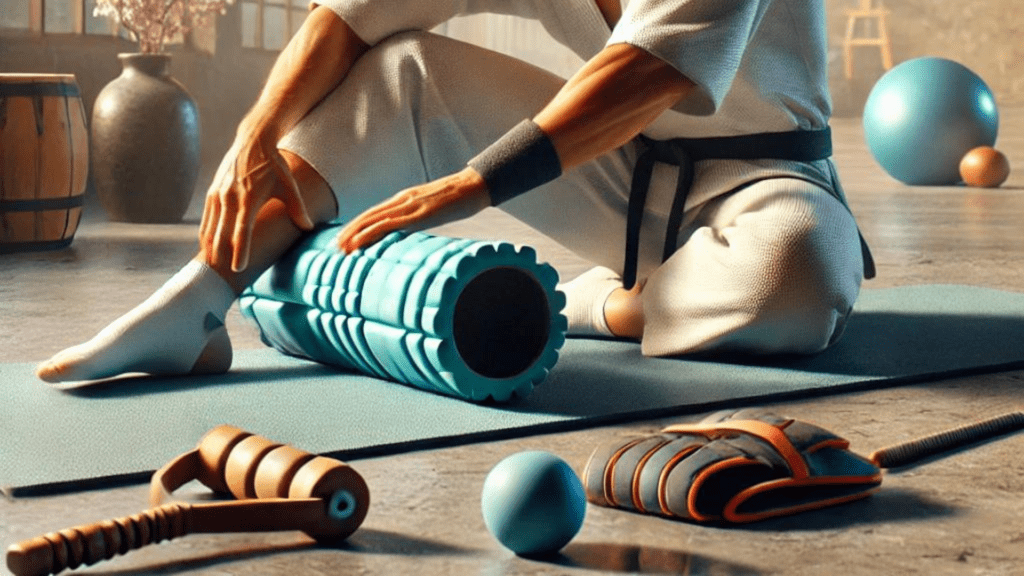Table of Contents
Introduction
Recovery workouts are an essential part of any training regimen, especially for martial artists who push their bodies to the limit. Proper recovery allows your muscles to repair, reduces the risk of injury, and enhances overall performance. In this guide, we’ll explore how to incorporate recovery workouts into your routine, ensuring you rest and rebuild effectively.
The Importance of Recovery Workouts
Muscle Repair and Growth
Intense training sessions cause microscopic damage to muscle fibers. Recovery workouts facilitate muscle repair and growth, making you stronger and more resilient.
Injury Prevention
Adequate recovery helps prevent overuse injuries and reduces muscle soreness. Incorporating recovery workouts into your routine ensures that your body can handle the demands of intense training.
H2: Enhanced Performance
Rest and recovery are crucial for maintaining high performance levels. They help you stay fresh, focused, and ready for your next training session or competition.
Types of Recovery Workouts
Active Recovery
Benefits: Active recovery involves low-intensity exercise that increases blood flow to muscles, aiding in recovery without adding additional stress.
Examples:
- Light Jogging or Walking: 20-30 minutes at a comfortable pace.
- Swimming: Low-impact exercise that promotes muscle relaxation.
- Cycling: Gentle cycling for 20-30 minutes.
Stretching and Mobility Work
Benefits: Stretching and mobility exercises improve flexibility, reduce muscle stiffness, and enhance range of motion.
Examples:
- Dynamic Stretching: Perform dynamic stretches before workouts to prepare your muscles.
- Static Stretching: Hold stretches for 20-30 seconds post-workout to improve flexibility.
- Foam Rolling: Use a foam roller to release muscle tension and improve blood circulation.
Yoga and Pilates
Benefits: Yoga and Pilates focus on controlled movements and breathing, enhancing flexibility, core strength, and mental relaxation.
Examples:
- Yoga: Practice yoga poses like downward dog, pigeon pose, and child’s pose.
- Pilates: Incorporate Pilates exercises like leg circles and the hundred for core stability.
Massage Therapy
Benefits: Massage therapy helps reduce muscle tension, improve circulation, and promote relaxation.
Examples:
- Professional Massage: Schedule regular sessions with a licensed massage therapist.
- Self-Massage: Use tools like massage balls or foam rollers to target specific muscle groups.
How to Incorporate Recovery Workouts into Your Routine
Schedule Regular Recovery Days
Plan at least one or two recovery days per week, depending on your training intensity. Use these days to focus on low-intensity activities and stretching.
Listen to Your Body
Pay attention to signs of overtraining, such as persistent muscle soreness, fatigue, and decreased performance. Adjust your recovery workouts based on how your body feels.
Hydration and Nutrition
Proper hydration and nutrition play a crucial role in recovery. Drink plenty of water and consume a balanced diet rich in proteins, carbohydrates, and healthy fats to support muscle repair and energy replenishment.
Example Recovery Workout Plan
Active Recovery Day
Morning: Light Jogging or Walking
– 20-30 minutes at a comfortable pace
Afternoon: Dynamic Stretching
– Perform a series of dynamic stretches for 10-15 minutes
Evening: Gentle Yoga Session
– 30 minutes of yoga focusing on relaxation and flexibility
Stretching and Mobility Day
Morning: Foam Rolling Session
– Spend 10-15 minutes foam rolling major muscle groups
Afternoon: Static Stretching Routine
– Hold each stretch for 20-30 seconds, focusing on tight areas
Evening: Pilates Exercises
– 20-30 minutes of Pilates to enhance core strength and stability
Conclusion
Recovery workouts are a vital component of any martial artist’s training regimen. By incorporating active recovery, stretching, yoga, and proper hydration and nutrition, you can enhance your performance, prevent injuries, and ensure your body is ready for the next challenge. Make recovery a priority and experience the benefits of a well-rounded training program.
Ready to optimize your recovery routine?
Start incorporating these recovery workouts into your schedule and feel the difference in your performance. Share your favorite recovery techniques and tips in the comments below!
External Links:



